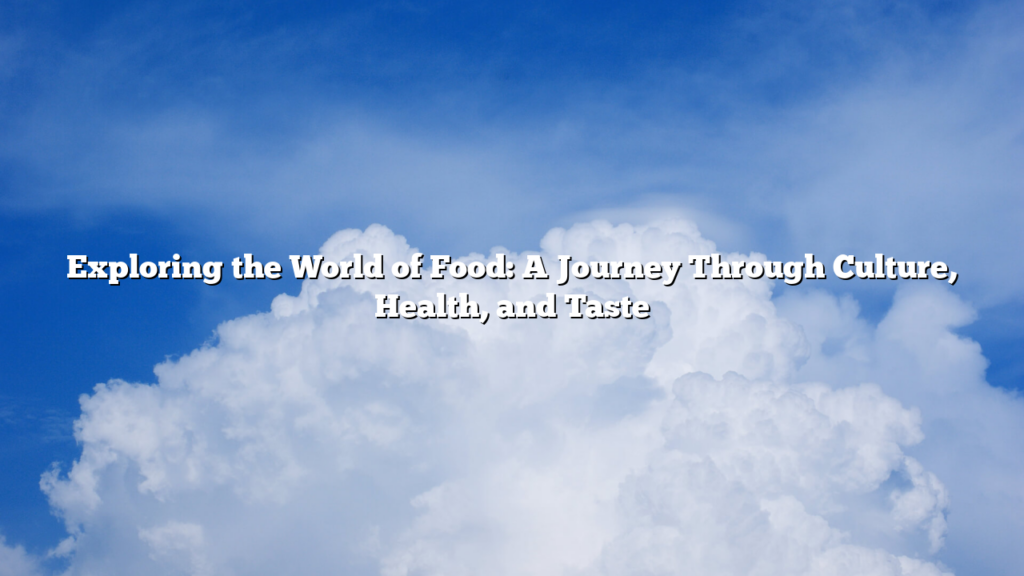
Exploring the World of Food: A Journey Through Culture, Health, and Taste
Food is more than just a source of nourishment; it is a symbol of culture, history, and human
connection. It brings people together, evokes memories, and allows us to explore different
parts of the world without ever leaving our homes. From the simplest meals to the most
intricate culinary creations, food plays a central role in our daily lives and in shaping our
identity. In this article, we will explore food from various angles, including its cultural
significance, nutritional benefits, and how it impacts our health and environment.
Food and Culture: A Global Tapestry of Tradition
Food is deeply intertwined with culture. Every region, country, and community has its own
unique dishes, ingredients, and methods of preparation that reflect their history, geography,
and values. The diversity of global cuisines is a testament to humanity’s creativity and
ingenuity in making the most out of available resources.
For instance, Italian cuisine is known for its rich flavors and use of fresh, seasonal
ingredients. Dishes like pasta, pizza, and risotto have transcended national borders and
become beloved worldwide. Meanwhile, Indian cuisine offers a wide array of spices, herbs,
and vegetables, creating a vibrant tapestry of flavors. The art of balancing spices, such as
cumin, turmeric, and coriander, is fundamental to many Indian dishes like curry and biryani.
In the Middle East, food plays a central role in hospitality and social gatherings. Traditional
dishes like hummus, falafel, and kebabs are often served in large communal meals, fostering
a sense of togetherness. Similarly, in Japan, food is a reflection of respect for nature and
simplicity, with sushi, sashimi, and tempura showcasing the elegance of seasonal
ingredients.
Whether it’s the comforting warmth of a bowl of soup on a cold day or the intricate
presentation of a French pastry, food is a canvas for creativity and a way for cultures to
express their values, traditions, and even their worldview.
Food and Health: Nourishment for the Body
Food is the foundation of good health. The nutrients in the food we eat provide the body with
the energy and building blocks necessary for growth, repair, and overall function. However,
the modern food landscape has made it increasingly difficult to make healthy choices, with
processed foods, fast food, and sugary snacks readily available. Understanding the
nutritional value of food is essential to maintaining a balanced diet and ensuring we get the
proper vitamins, minerals, and macronutrients.
A balanced diet typically includes a variety of food groups: fruits, vegetables, whole grains,
proteins, and healthy fats. Fruits and vegetables are rich in vitamins, minerals, and
antioxidants, which help protect the body from diseases and maintain skin health. Whole
grains, such as brown rice, quinoa, and oats, provide fiber, which aids digestion and helps
control blood sugar levels. Protein sources like lean meats, fish, eggs, legumes, and nuts
are vital for muscle growth and immune function. Healthy fats, found in foods like avocados,
olive oil, and nuts, support brain health and hormone production.
In recent years, plant-based diets have gained popularity due to their potential health
benefits, including a lower risk of heart disease, cancer, and obesity. Vegetarian and vegan
diets, which focus on plant-derived foods, can provide all the necessary nutrients when
planned correctly, and many people have found these diets to be beneficial not only for their
health but also for the environment.
Food and the Environment: Sustainability and Ethical Eating
As the global population grows, the demand for food increases, leading to concerns about
sustainability and the environmental impact of food production. Agriculture, particularly
livestock farming, is a significant contributor to greenhouse gas emissions, deforestation,
and water pollution. The way we produce and consume food has profound implications for
the health of the planet.
Sustainable eating involves making choices that support the long-term health of the
environment. This includes reducing food waste, choosing locally-sourced and seasonal
foods, and opting for sustainable farming practices. One example of sustainable food
production is regenerative agriculture, which focuses on restoring soil health, conserving
water, and reducing reliance on chemical fertilizers and pesticides.
The rise of plant-based diets also ties into the conversation about sustainability. Reducing
meat consumption, especially red meat, can significantly lower an individual’s carbon
footprint. Plant-based proteins, such as lentils, beans, and tofu, require fewer resources to
produce than animal-based proteins. Additionally, these alternatives are often more
affordable and offer a variety of health benefits.
Another important aspect of ethical eating is considering the welfare of animals in food
production. Many consumers are becoming more conscious of where their food comes from
and how animals are treated. This has led to a growing demand for ethically sourced and
humane products, such as free-range eggs, grass-fed beef, and pasture-raised poultry.
The Joy of Food: A Source of Pleasure and Connection
While food is necessary for survival, it is also a source of immense joy. The act of sharing a
meal with friends or family is one of the most cherished human experiences. Food brings
people together, creating bonds and fostering community. Whether it’s a holiday feast, a
casual dinner, or a celebration, food has the power to turn ordinary moments into memorable
occasions.
Cooking is also a form of self-expression. Preparing a meal can be a creative outlet, allowing
individuals to experiment with new flavors, techniques, and ingredients. The sense of
accomplishment and satisfaction that comes from creating something delicious with your
own hands is unmatched. Additionally, food can evoke powerful memories, from childhood
meals to special gatherings, making it a vital part of our emotional well-being.
Conclusion: The Multifaceted Nature of Food
Food is far more than just a means of sustenance. It is a cultural artifact, a key to health and
longevity, a driver of environmental change, and a source of happiness and connection. By
understanding and appreciating the role of food in our lives, we can make more mindful
choices that not only benefit our bodies but also the planet and the people around us.
Whether medali777 are cooking a simple dish or savoring a complex recipe, food is a reminder of
our shared humanity and the beauty of life itself.



